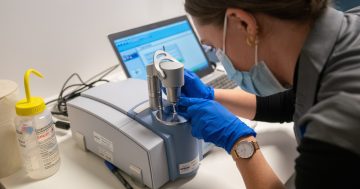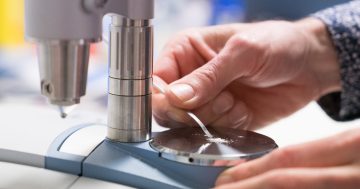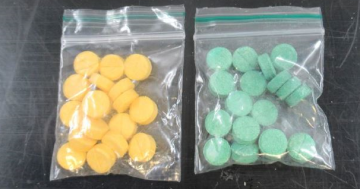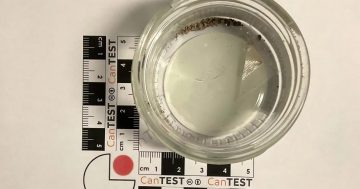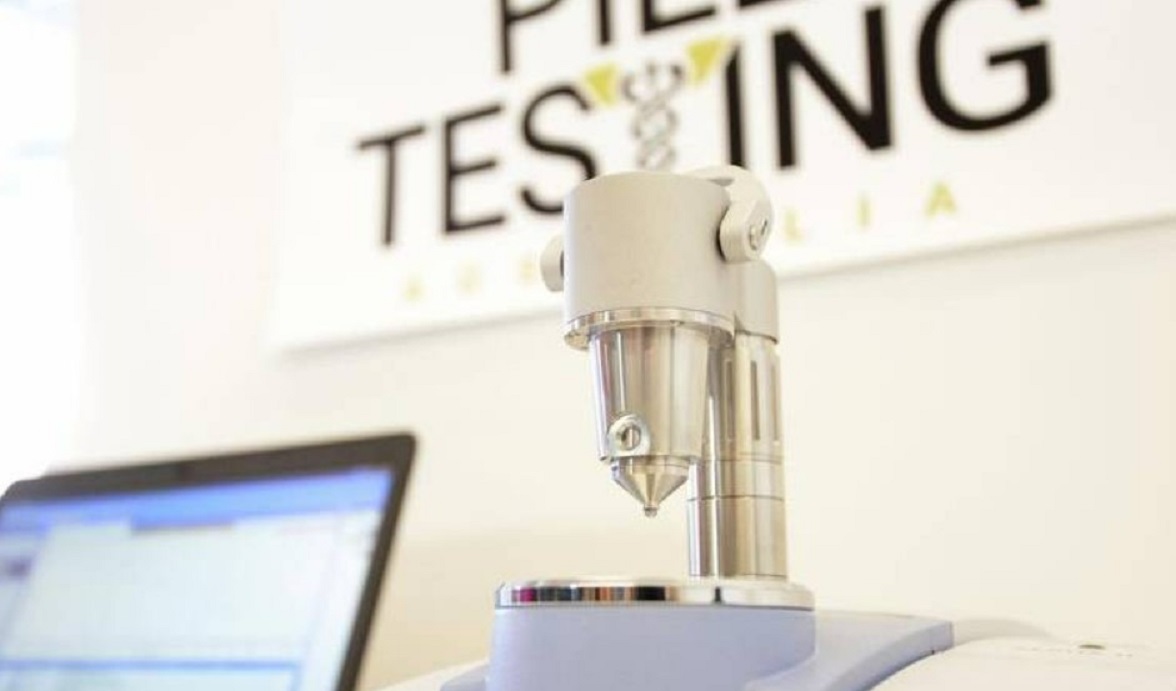
The number of drugs tested at Canberra’s fixed site almost doubled in the past month. Photo: Pill Testing Australia.
A new version of ketamine and caffeine in place of MDMA were among the standout results discovered during the second month of Canberra’s fixed pill testing site.
The CanTEST facility tested 98 samples over the past four weeks, which was almost double the number from its first month of operation.
Canberra Alliance for Harm Minimisation and Advocacy (CAHMA) provided the peer workers at the centre. Its executive director Chris Gough said it was excellent to see more people taking advantage of the service.
“It’s a pretty big thing to ask people to bring something illegal to a health service … it shows more people are trusting the service,” he said.
“It also feels like we’ve gotten over the crest of the hill. This is well and truly justifying drug checking as a service.”
There were some surprises among the results this month, including the appearance of a new version of ketamine, listed as 2-fluro-2-oxo-PCE (2F-NENDCK).
There wasn’t an easier name for it as the psychoactive substance – which people expected would be ketamine – was yet to be studied.
“There were four [ketamine] samples, and what’s interesting is that these samples were completely that substance. It wasn’t used as a cutting agent,” CAHMA peer worker Mitch Lamb said.
Ketamine was expected in 16 samples presented at the clinic, but only six actually contained the drug.
In a community alert put out by CAHMA, ketamine users were warned the newly identified substance was not studied, and therefore its effects weren’t known.
“Users of K are highly encouraged to test their supply and exercise high caution,” it said.
Mr Gough said this highlighted how important it was for the community to have easy access to drug checking.
“We’re finding all these compounds … and then we’re able to put out these alerts to protect the community from these novel synthetic chemicals,” he said.
“It’s important to be able to have the right machines but also the right communication points to let people know what’s in their drugs.”
A community alert was also put out about Dimethylpentylone, which was discovered in an MDMA sample as a secondary component.
Mr Gough explained this compound could give a very different experience to someone expecting the outcome of taking MDMA, which could be dangerous.
“You can experience up to 72 hours of no sleep on a high dose of this,” he said.
“While the effects of MDMA taper off after several hours … this could last for up to three days, and if you have to drive home, you need to know that information so you can ensure you’re being safe and not driving.”
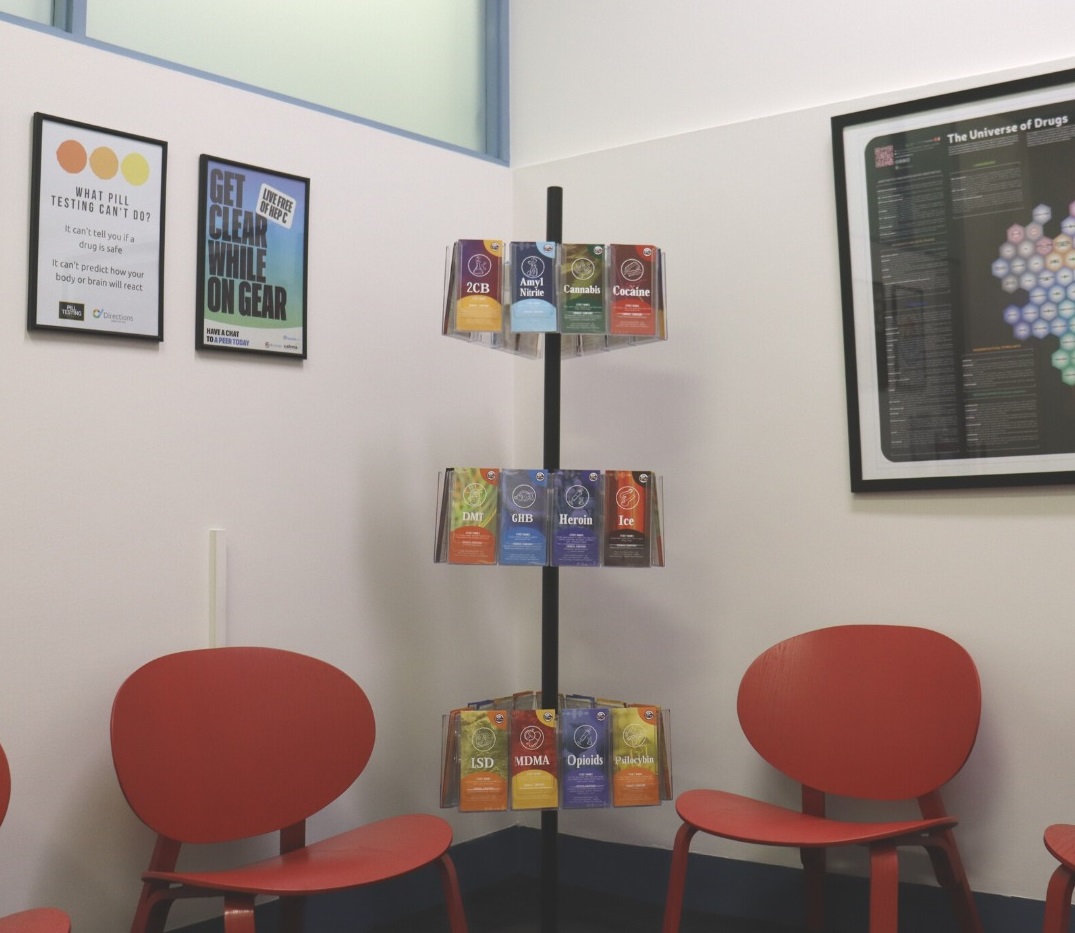
The waiting room at Canberra’s fixed drug checking site. Photo: CAHMA Facebook.
Another critical piece of health information was how pure each sample was, which would influence what kind of harm minimisation messages could be given to the community.
The purity of the three samples of methamphetamine were all in the 60 to 69 per cent range.
“If people can expect their meth to be quite pure, this means you need to exercise caution when taking it, make sure you’re hydrated, factor in proper sleep hygiene and nutrition,” Mr Gough said.
The purity of the heroin and MDMA samples was “widely variable”.
MDMA was expected in 34 samples and found in 30, and ranged from less than 5 per cent pure to 82 per cent pure.
The purity of the three heroin samples ranged from 27 per cent to 71 per cent.
“So here you need another degree of caution, as each experience could be different,” Mr Gough said.
Mr Lamb agreed and said it also enabled people to be more prepared for what to expect if they still chose to take the drug.
“It’s never going to be safe, but the more information you have, the safer you can be,” he said.
“We’re trying to encourage more youth to come in and exercise classic harm reduction strategies when they choose to experiment.
“We have a duty of care in society to reduce harm as much as possible.”
Mr Lamb said more access to drug usage health information was critical to the centre.
“For illicit drugs, we’ve pushed everyone who uses them and all the information about them to the side, and so it becomes hard to access and difficult to engage with,” he said.
“For someone to know they can come to us and there are no negative consequences to their families, relationships, jobs or criminal record, and get information about what you’re going to use and harm reduction strategies, that’s crucial.”
Mr Gough said that access to such a service was a “revelation” for some people.
“For some people, it’s the first time they’ve been able to talk about drugs with a health professional,” he said.
CanTEST is a collaboration with Directions Health Services, CAHMA, Pill Testing Australia and ACT Health. The trial will be held for six months. The centre is located at the City Community Health Centre at 1 Moore St, Civic, and is open Thursdays between 10 am and 1 pm and Fridays between 6 pm and 9 pm.












